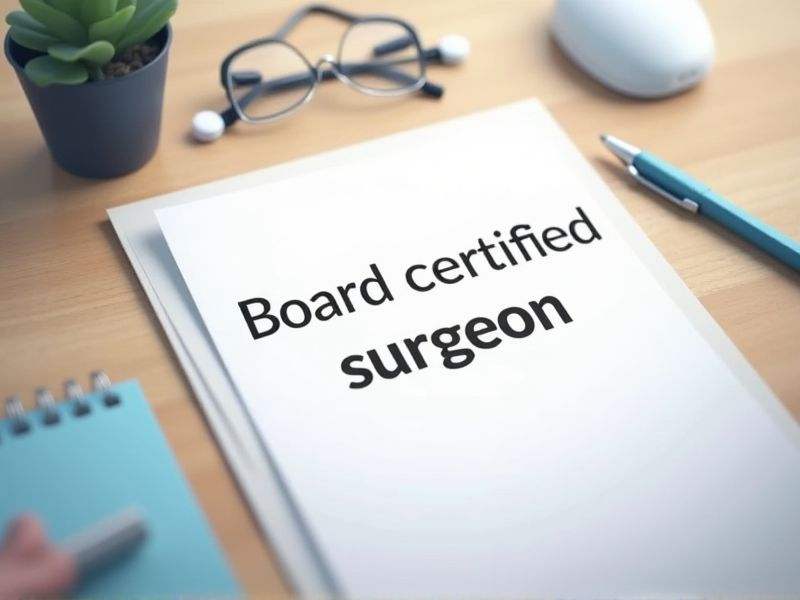
Board certification indicates a surgeon's commitment to professional excellence and patient safety, driven by rigorous education and testing. The medical field evolves rapidly, necessitating surgeons to continuously update their skills through various certifications. Certifications ensure adherence to the latest surgical techniques and technology, enhancing patient outcomes. Important certifications are necessary for a Board-certified surgeon to meet and maintain these high standards.
American Board of Surgery Certification
The American Board of Surgery Certification ensures a surgeon has met rigorous national standards, signifying competence in essential surgical skills and knowledge. It builds patient trust, as certification reflects a professional's commitment to maintaining quality care. Hospitals and surgical centers often require certification for granting surgical privileges, impacting a surgeon's employment opportunities. Certification supports ongoing professional development, requiring periodic renewal, which encourages surgeons to stay updated with advances in medical practices.
Fellow of the American College of Surgeons (FACS)
Being recognized as a Fellow of the American College of Surgeons (FACS) signifies that a surgeon adheres to the highest standards of surgical practice and ethical conduct, enhancing trust with patients. This credential reinforces continued professional development, which is critically important for keeping up with advancements in surgical techniques and patient care. Surgeons with FACS accreditation show dedication to improving surgical outcomes, as the College provides numerous educational resources and rigorously evaluates its Fellows. For a Board-certified surgeon, FACS offers a valuable peer network that encourages collaboration and sharing of best practices, pivotal for refined decision-making in complex cases.
Advanced Trauma Life Support (ATLS)
Board certified surgeons benefit from Advanced Trauma Life Support (ATLS) training because it standardizes the assessment and management of trauma patients, ensuring that they can effectively address critical injuries. ATLS provides a systematic approach that enhances decision-making skills in high-stress environments, which is crucial during the golden hour of trauma care. This training improves outcomes by enabling surgeons to quickly identify and prioritize life-threatening conditions. Consistent ATLS training ensures that all trauma care providers speak a common language, facilitating seamless communication in multi-disciplinary teams.
Advanced Cardiac Life Support (ACLS)
Board-certified surgeons encounter complex surgical procedures where cardiac emergencies may arise, necessitating ACLS competence. Proficiency in ACLS equips them to stabilize patients experiencing cardiac arrest or severe cardiac events during or after surgery. Understanding of ACLS protocols enhances interprofessional collaboration in critical scenarios, increasing patient survival rates. Surgeons adept in ACLS contribute to comprehensive perioperative care, aligning with standards for patient safety.
Basic Life Support (BLS)
Board-certified surgeons require Basic Life Support (BLS) training to ensure they can manage life-threatening emergencies outside the operating room. In emergency situations like cardiac arrest, immediate BLS intervention by a surgeon can significantly increase patient survival rates. Surgeons often lead multidisciplinary teams where BLS proficiency enables them to coordinate effective emergency responses. BLS knowledge helps surgeons understand and work seamlessly with other healthcare providers who may initiate these lifesaving procedures.
Pediatric Advanced Life Support (PALS)
Board-certified surgeons benefit from Pediatric Advanced Life Support (PALS) as it equips them with specialized knowledge for managing critical pediatric emergencies. This training enhances their ability to recognize and treat life-threatening conditions in children, which differ physiologically from adults. Access to PALS protocols ensures quicker, evidence-based decision-making during high-pressure situations involving young patients. Comprehensive PALS skills in surgeons improve overall patient outcomes by enabling accurate responses to pediatric emergencies that may arise during or after surgical procedures.
Minimally Invasive Surgery Certification
Minimally invasive surgery certification equips board-certified surgeons with specialized skills, reducing patient recovery time and hospital stay. This certification assures patients and healthcare providers of a surgeon's proficiency in advanced surgical techniques. Hospitals and healthcare systems increasingly prioritize surgeons with this credential to enhance patient care quality and outcomes. Surgeons with this certification can access a broader range of professional opportunities and advancements in the medical field.
Surgical Critical Care Certification
Surgical Critical Care Certification provides board-certified surgeons with specialized skills to manage critically ill surgical patients, which enhances patient outcomes. The certification ensures surgeons are up-to-date with advanced techniques and knowledge, crucial in high-stakes environments like intensive care units. It establishes a standard of excellence that can boost professional credibility and career advancement. The demand for intensive care services in hospitals necessitates surgeons who can efficiently transition from operative to critical care settings.
Robotic Surgery Training Certification
Robotic surgery training certification ensures that board-certified surgeons can proficiently operate advanced surgical robots, directly reducing the risk of procedural errors. This certification enhances a surgeon's skill set, allowing them to offer minimally invasive options that often lead to improved patient outcomes and faster recovery times. Hospitals and healthcare facilities may require such certifications to meet accreditation standards and provide competitive, cutting-edge care. Surgeons with robotic training are better positioned to adapt to evolving technologies in the healthcare industry.
Surgical Infection Prevention & Control Certification
Surgical Infection Prevention & Control Certification ensures a board-certified surgeon stays updated on the latest protocols, reducing postoperative infection rates. As medical standards evolve, certification helps maintain compliance with industry best practices, enhancing patient safety. Consistent training and certification demonstrate a surgeon's commitment to quality care, fostering trust and credibility among patients and peers. Regulatory bodies and health institutions often require such certifications to meet the benchmarks for accreditation and safe surgical environments.
Summary
As a patient seeking care, you'll likely experience enhanced trust and assurance when a Board-certified surgeon obtains additional certifications. Surgeons gain specialized skills and updated knowledge, which directly impacts their competency and expertise. This progression often translates into improved surgical outcomes and reduced risk of complications. Consequently, the healthcare facility may also see increased reputation and patient satisfaction scores due to heightened quality of care.
